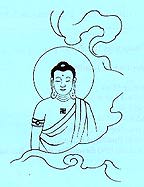ENLIGHTENMENT
Source: BY VENERABLE MASTER HSING
YUN
Date: 2003 / 04 / 05
Merchants do business for a profit, scholars
study for better reasoning, religious people practice for realization of the Way,
and Chan practitioners cultivate for enlightenment. Enlightenment means understanding
the relationship of self and others, causes, conditions, time, space, the future
and the similar origins of all. However, how many people in the world can truly
be enlightened? In reality, with small doubt, there is small enlightenment; big
doubt, major enlightenment; and with no doubt, no enlightenment. If we want to
understand clearly the problems of life and the universe, and manage the relationships
of self and others with equality and harmony, it takes enlightenment for us to
succeed.
Is enlightenment like: "I appreciate, I can think through, I
understand, I know?" Is that truly knowing? "Understanding" and
"appreciating" are only about knowledge that is similar. By being enlightened,
we need to appreciate the oneness of you and me, the equality between self and
others, and that emptiness is form, and form is emptiness. From the perspective
of the true Dharma nature, existence and emptiness are not opposites but one and
the same. Therefore, worries are bodhi because only worries can be transformed
into bodhi.
When Chan practitioners observe flowers bloom and wither, they
are enlightened to the impermanence of the world. Seeing parents scolding or punishing
their children, they know the suffering in life. They witness fighting and gossip
between people, the equality of self and others. They realize all phenomena have
no self nature, the causes and conditions of suffering, emptiness, and impermanence.
When we appreciate that all phenomena are empty, and that from emptiness comes
endless wondrous existence, we can be enlightened!
In our everyday life, there
are many problems we need to explore. Why do we feel satisfied after we eat? Why
does tea quench our thirst? Why do clothes keep us warm? Why are people happy
when hearing kind words? When we know more "whys," we can become thorough
and complete in our thinking. Small enlightenments may come right away, and by
accumulating them over time, we will gain complete enlightenment one day.
When
we see the front we should also understand the back, and when we observe the east
side, we should appreciate the west side as well. Once we learn about the cold
of winter, we also need to know about the warmth of spring. As we feel the austerity
of fall, we should realize the heat of summer in nurturing all things. When we
know ten from one and that one is everything, we can be free from the mistake
of the blind men touching an elephant. We will then avoid the trap of knowing
only one but not another or to become attached to our ignorance. The difference
between ignorance and enlightenment just hinges on a single thought here and now!
Chan Buddhism does not teach people to become Buddhas but to become enlightened
in the practice. When we are able to realize the Way, we will naturally be diligent
in our practice. Enlightenment is like opening the eye of wisdom. With wisdom
on the path of life, mountains, water, flowers, and grass will accompany us on
our way to the future. When we see the phenomena of society and the world, our
mind will be like a clear mirror. We will see clearly, understand, and know it
all very well. It is not just looking at appearances but the causes and effects,
the beginning and development of the universe's phenomena and their relationships.
What a wonderful world of enlightenment that will be! 
